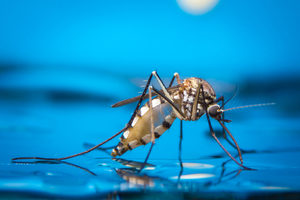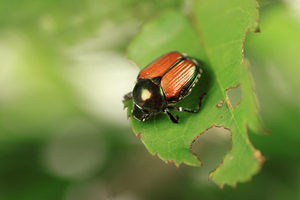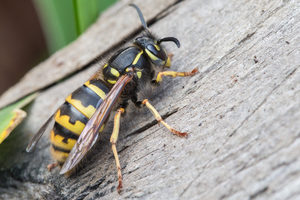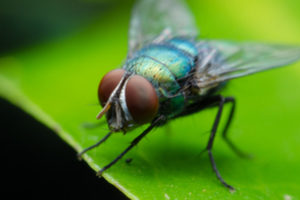If summer ever feels too good to be true, then consider summer bugs the catch. All kinds of bugs naturally grow and thrive in the heat and abundance. Add Michigan’s seasonal humidity to that mix, and you have a pest paradise. Paradise for these pests, specifically.
These are four of the pests that Michigan will have the most trouble with this summer. Here’s why these pests love summer, what they’re up to, and how to keep them away from you.
Mosquitoes
 When you think “summer bugs,” you almost certainly think of mosquitoes first and foremost. It’s not hard to understand why. There are over fifty mosquito species in Michigan, and they’re more-or-less all very active in summer. Lucky us. Some mosquito species start reproducing in spring. They lay eggs in puddles and other sources of “spring water” left behind by melting snow and rainfall. In general, the more standing water they have access to, the greater the mosquito population will be in summer.
When you think “summer bugs,” you almost certainly think of mosquitoes first and foremost. It’s not hard to understand why. There are over fifty mosquito species in Michigan, and they’re more-or-less all very active in summer. Lucky us. Some mosquito species start reproducing in spring. They lay eggs in puddles and other sources of “spring water” left behind by melting snow and rainfall. In general, the more standing water they have access to, the greater the mosquito population will be in summer.
Unfortunately, many mosquito species don’t stop reproducing in summer. Mosquito larvae grow faster in hot weather, so they’ll mature quickly, reproduce, and begin the cycle yet again. Mosquitoes thrive during hot, humid, and wet summers. You can’t really keep mosquitoes from thriving, but you can keep them away from you. Clean up sources of standing water near or inside your home. Make sure your window screens and frames seat properly. Address sources of excess humidity such as plumbing leaks or drafts.
Japanese Beetles
 Japanese beetles are an invasive species that can inflict serious damage on lawns, turf, and ornamental plants. Their grubs feed on the roots of grass, and adults eat foliage. Both grub and adult feeding habits may interfere with your plant’s ability to withstand the hot weather of summer. Larval Japanese beetles hibernate underground during winter. During spring, they begin eating roots until they store enough energy to pupate. By late June or early July pupation completes and the beetles emerge from the ground as adults.
Japanese beetles are an invasive species that can inflict serious damage on lawns, turf, and ornamental plants. Their grubs feed on the roots of grass, and adults eat foliage. Both grub and adult feeding habits may interfere with your plant’s ability to withstand the hot weather of summer. Larval Japanese beetles hibernate underground during winter. During spring, they begin eating roots until they store enough energy to pupate. By late June or early July pupation completes and the beetles emerge from the ground as adults.
Adult Japanese beetles are a particular problem for a couple reasons. First, they often skeletonize the foliage of the plants they feed on. Next, they produce a pheromone that attracts other beetles to plants. They also tend to reproduce and lay eggs near where they eat. That means if you have beetles this year, you’ll probably have them next year, too. If you see beetles on your plants this summer, spray them with soapy water to scare them off. The soap will also counteract the pheromone, so new beetles won’t replace the ones you sprayed away.
Wasps
 Wasp queens become active in late spring, when temperatures rise to a consistently hospitable temperature. During early-to-mid summer, wasps largely remain near their nests. Workers leave to hunt for food every day to bring food back to support wasp larvae. Wasps are highly defensive of their nests while larvae develop inside them. The majority of wasp stings in mid summer occur when people accidentally disturb a nest.
Wasp queens become active in late spring, when temperatures rise to a consistently hospitable temperature. During early-to-mid summer, wasps largely remain near their nests. Workers leave to hunt for food every day to bring food back to support wasp larvae. Wasps are highly defensive of their nests while larvae develop inside them. The majority of wasp stings in mid summer occur when people accidentally disturb a nest.
By late summer, wasp queens will finish laying eggs, and the colony’s behavior will change. The year’s final brood grow into the next generation of wasp kings and queens. Once they leave the nest, the workers no longer have to worry about feeding and fostering young. Instead, they range further and spend their time hunting and eating. They tend to sting more people during this stage, especially if people startle them near their food. If you you have a wasp’s nest on your property, have a professional remove it as soon as possible.
Get Started Today With Griffin!
Flies
 Several types of common flies thrive and proliferate in summer. These flies are sometimes called “filth flies,” because they’re attracted to rotting garbage and waste. Filth flies like the house fly seem so abundant in summer because they spend the whole season reproducing. These flies complete their entire life cycle in only seven to 14 days. A single summer season may see literally hundreds of generations of filth flies born.
Several types of common flies thrive and proliferate in summer. These flies are sometimes called “filth flies,” because they’re attracted to rotting garbage and waste. Filth flies like the house fly seem so abundant in summer because they spend the whole season reproducing. These flies complete their entire life cycle in only seven to 14 days. A single summer season may see literally hundreds of generations of filth flies born.
Fly infestations begin when flies find a place to lay their eggs indoors. House flies lay batches of 75 to 100 eggs at a time. Flies look for secluded, dirty places to lay their eggs. Usually, they find garbage, either in the dumpster or in cans. They may also infest clogged garbage disposals. Make sure your garbage is as sanitary and inaccessible as possible. Keep all garbage in sealable plastic bags, preferably inside sealed bins. Take garbage out to your dumpster frequently. Don’t let garbage pile up, either inside or in your dumpster.
No matter how inescapable they seem, you shouldn’t have to suffer bugs like these this summer. Following these steps will help you protect yourself from summer bugs, no matter how many assail you.
If you do end up with a summer bug infestation, however, remember that you always have help in Griffin Pest Solutions. No matter how entrenched or expansive the bug invasion, we’ll wipe it out quickly and effectively. We want to help you enjoy a bug-free summer!
